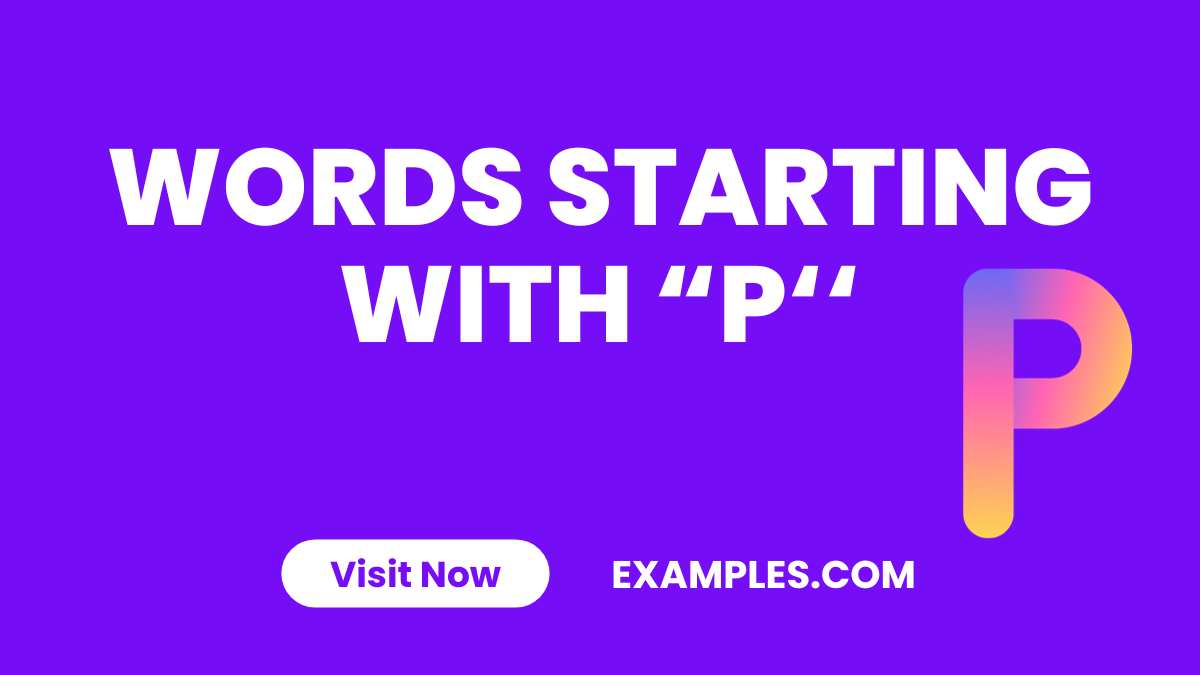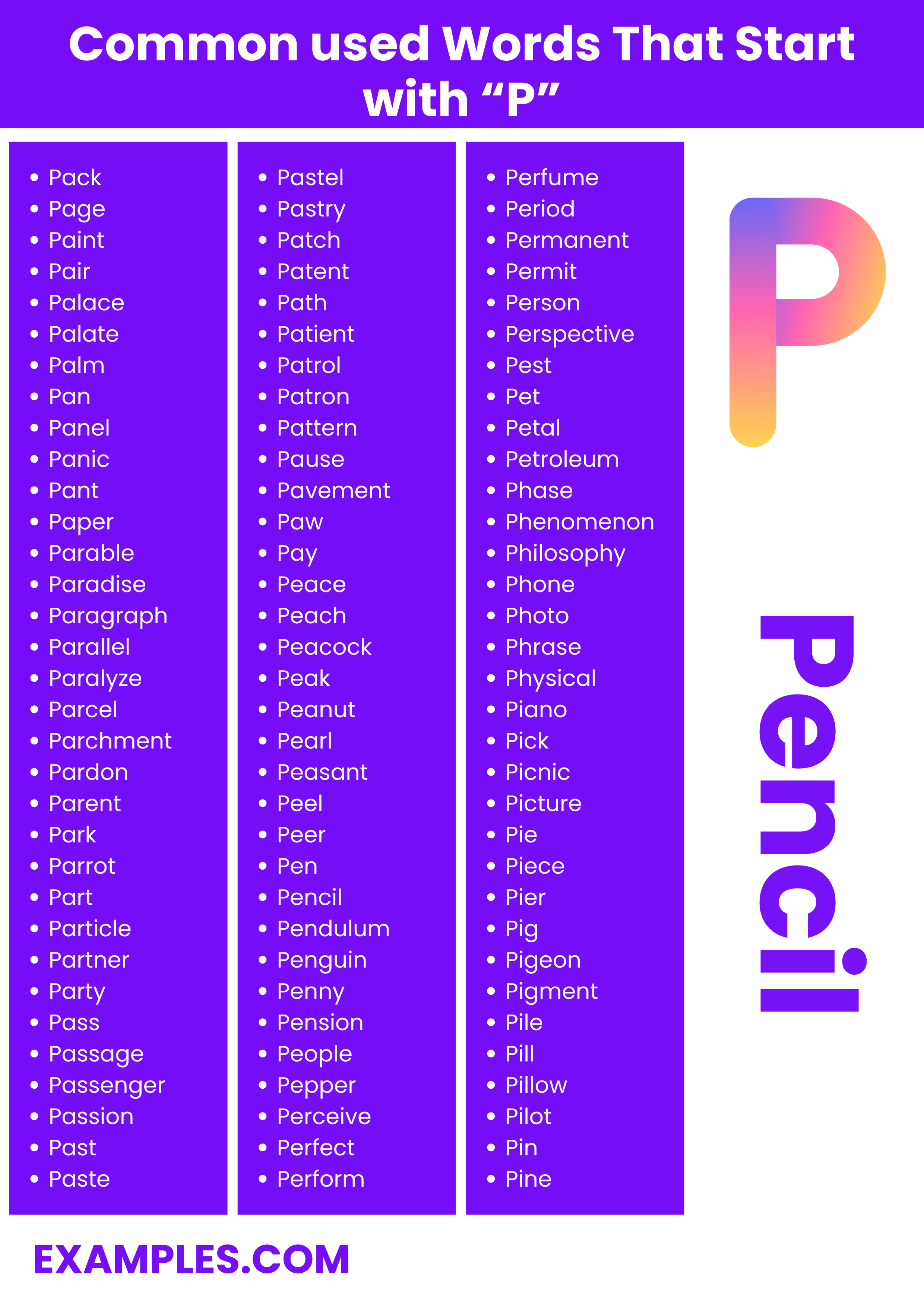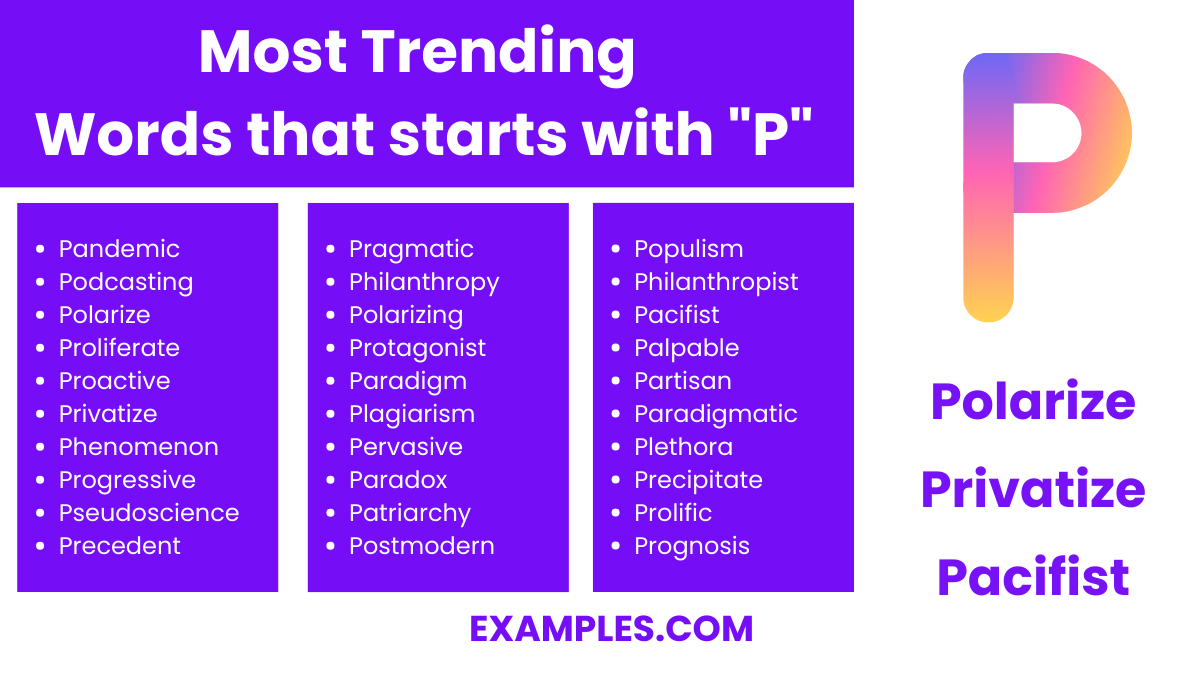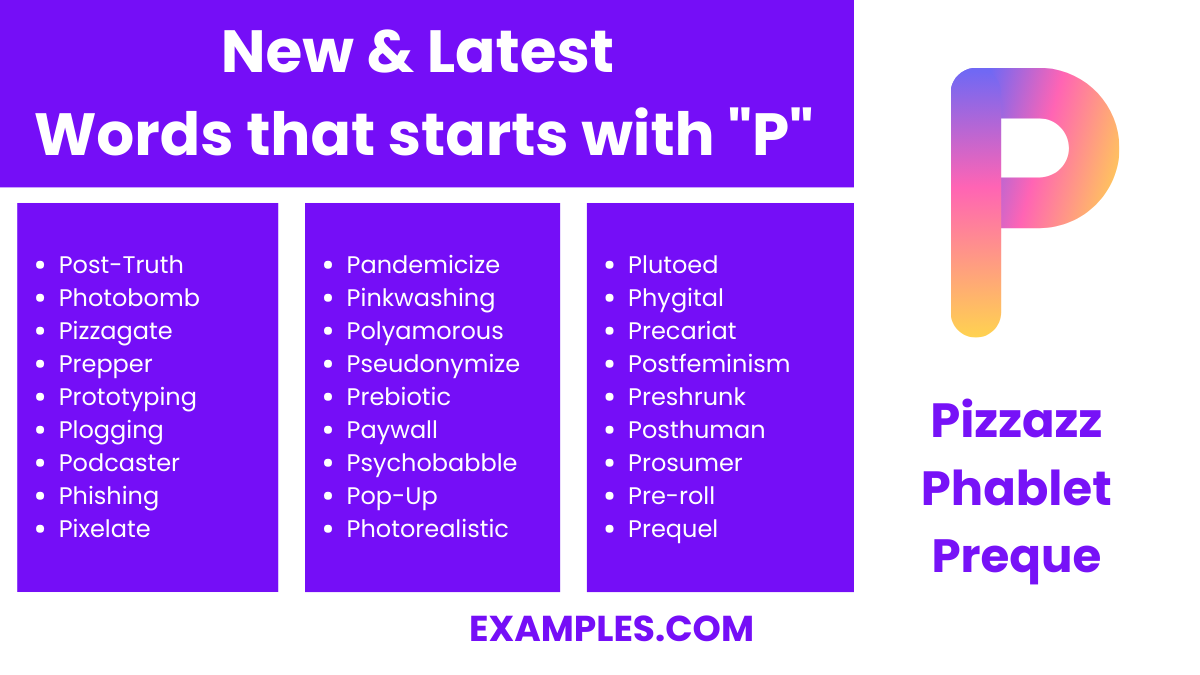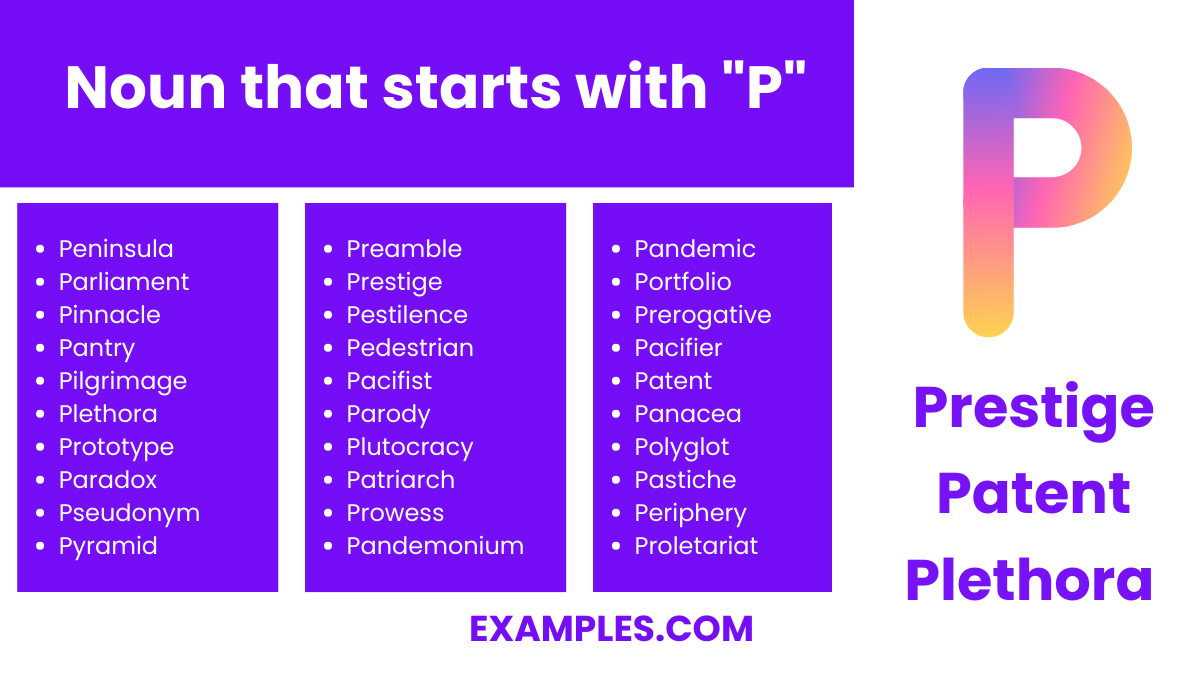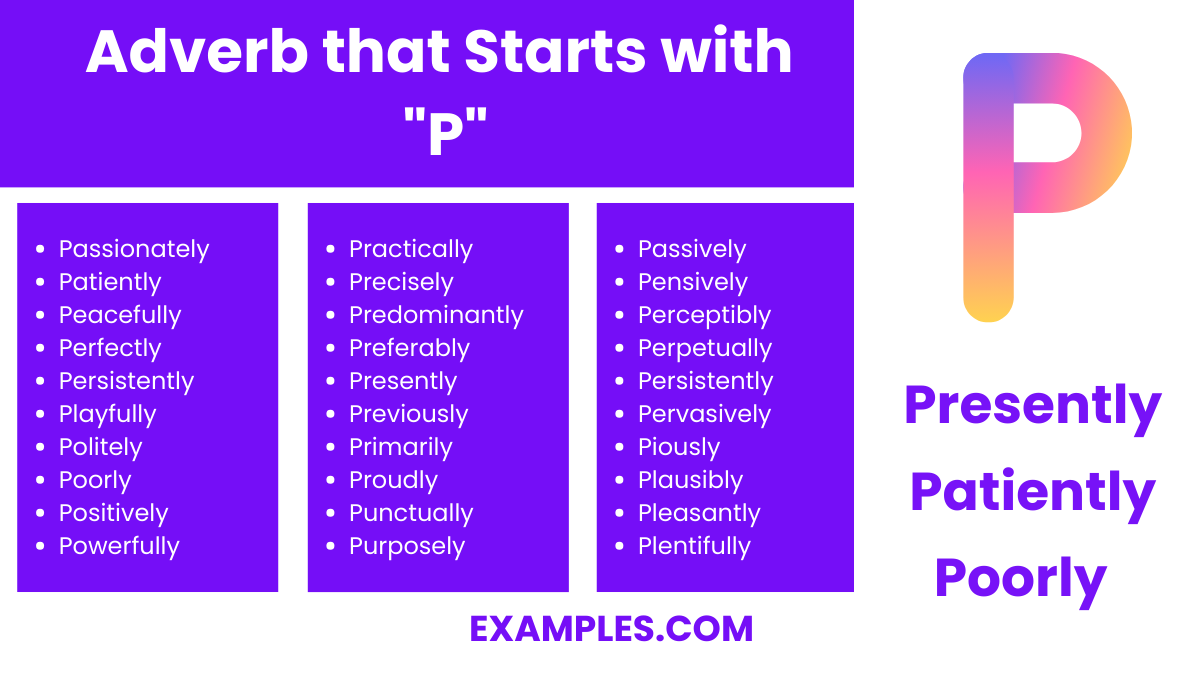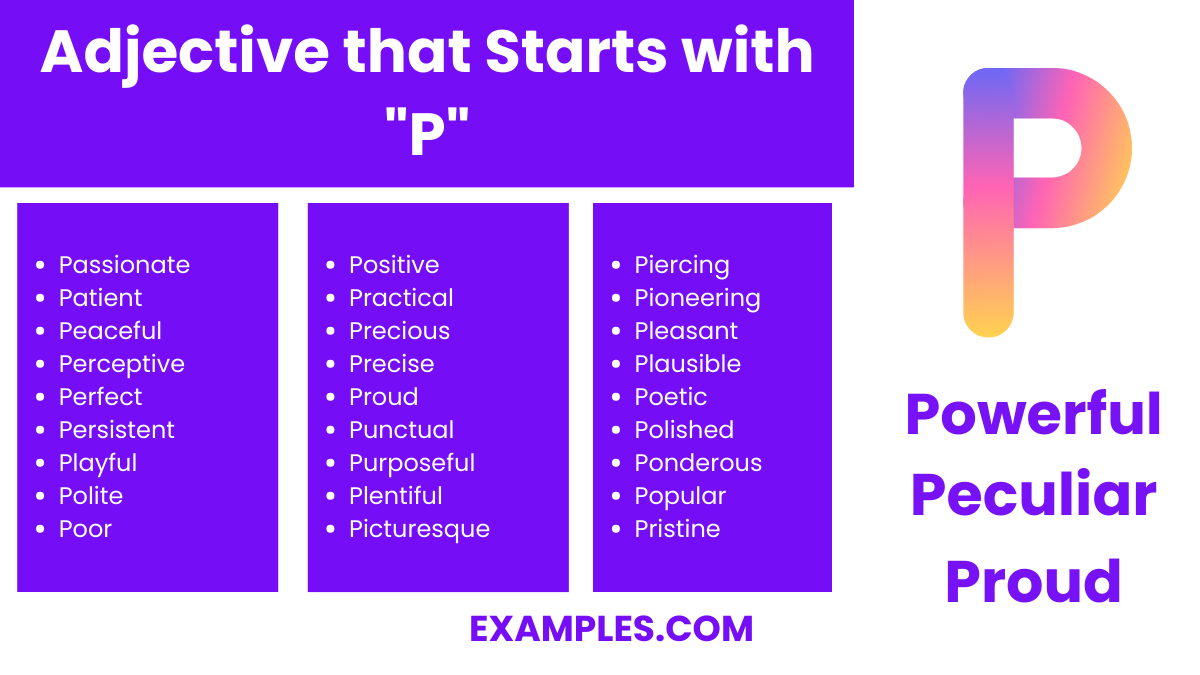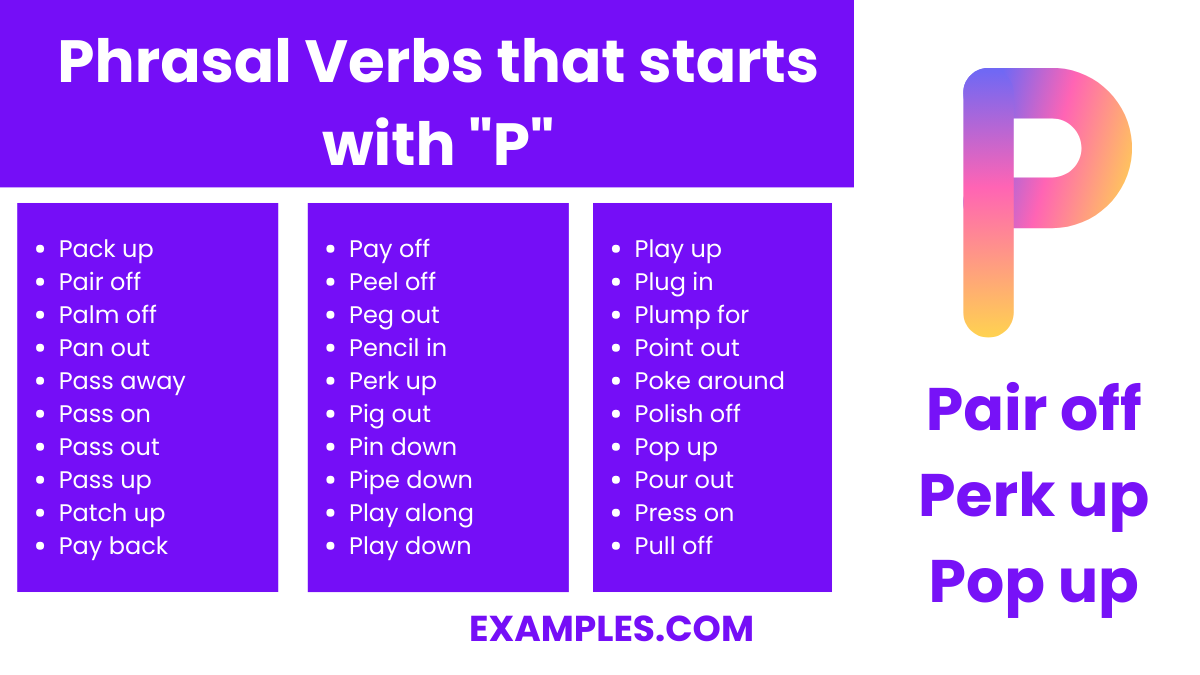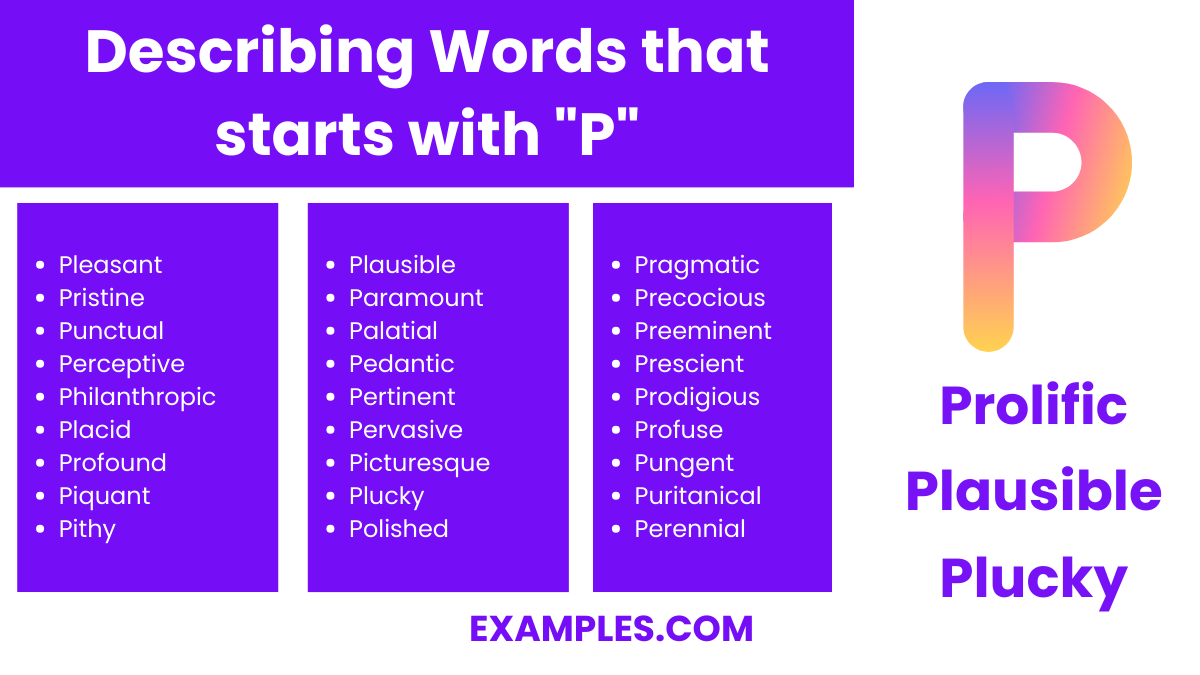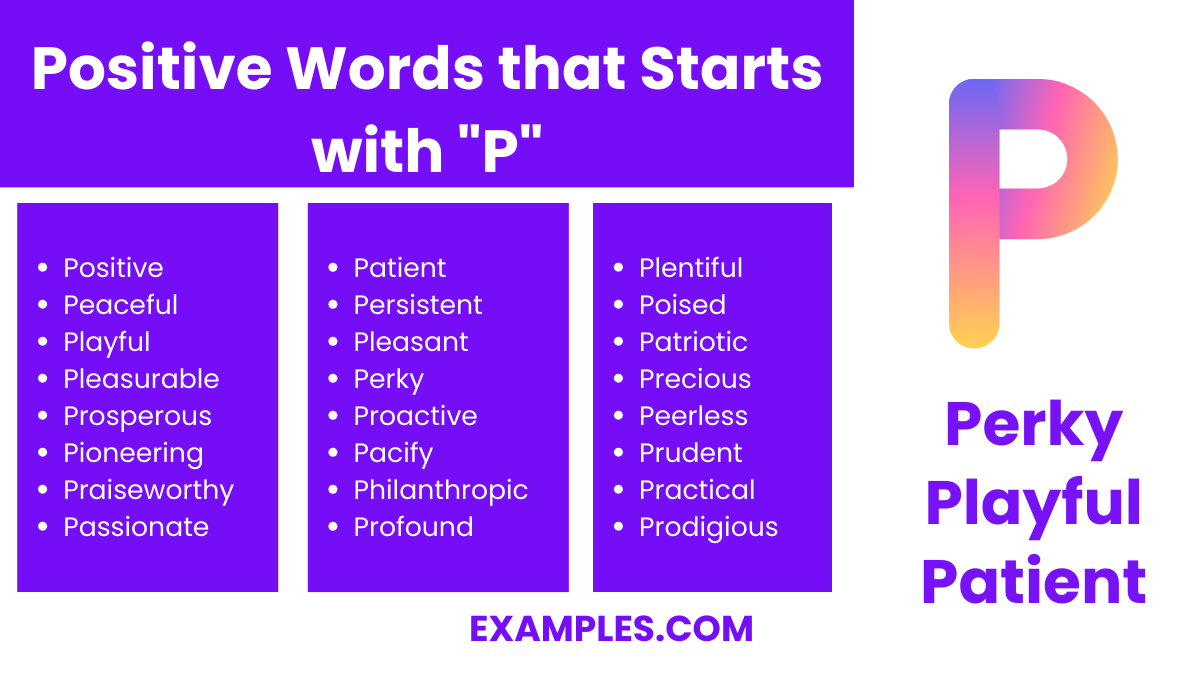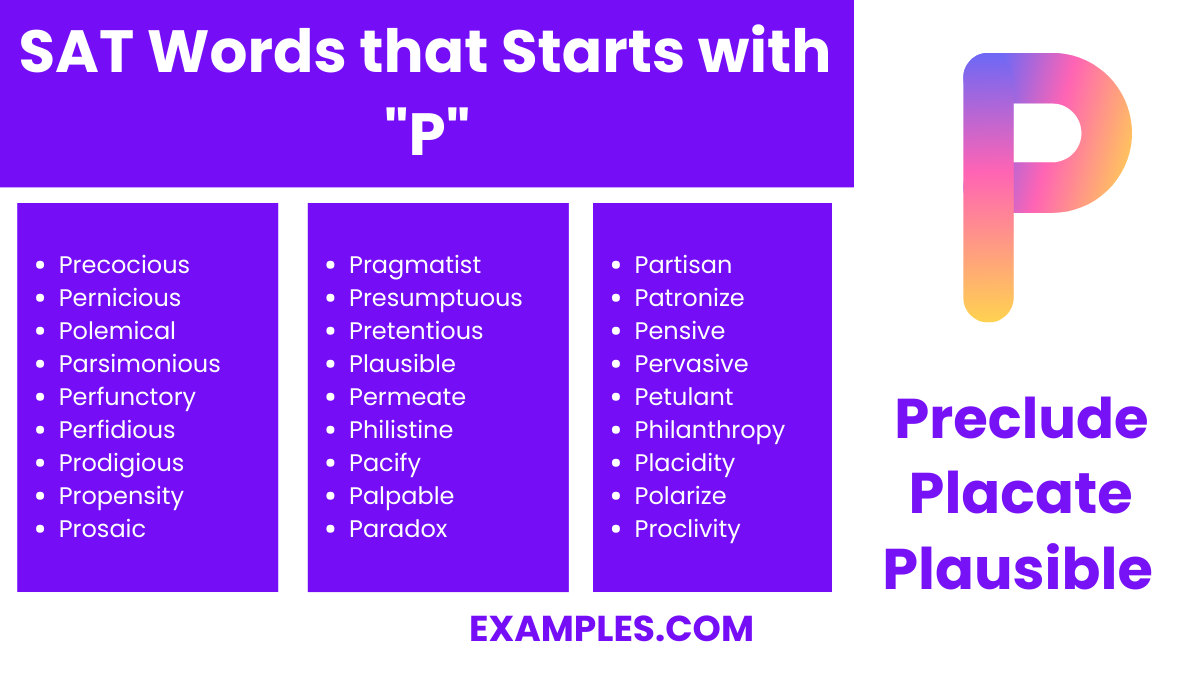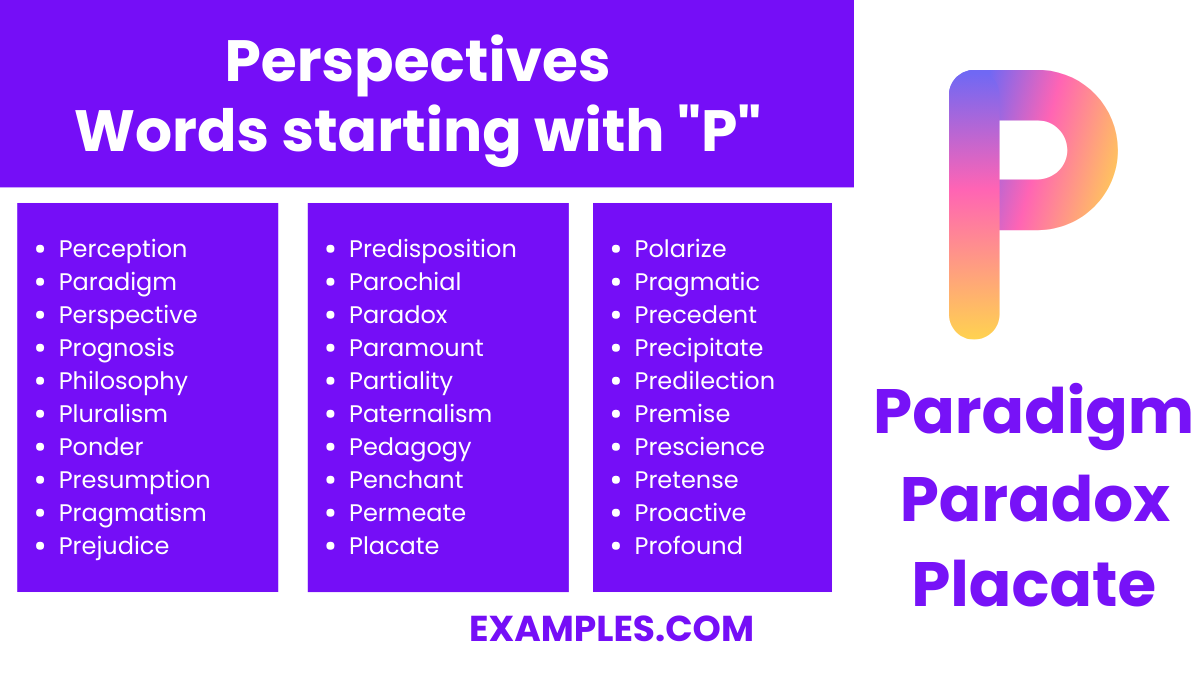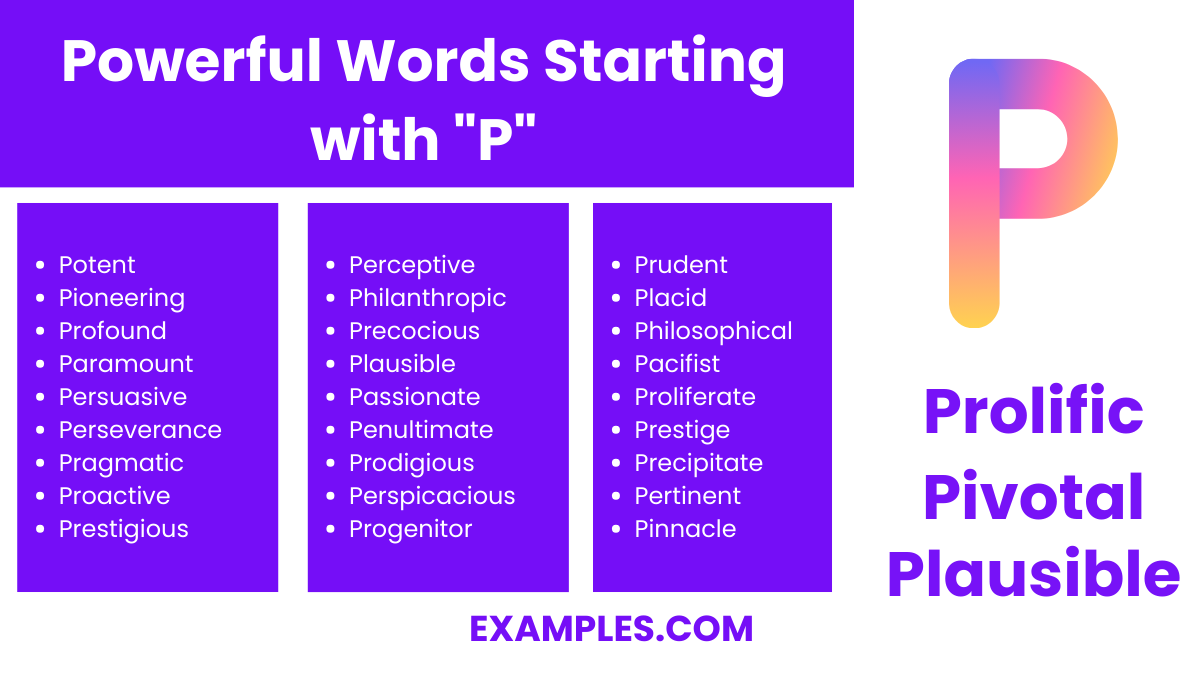450+ Words Starting with P List, Meaning, PDF
The exploration of words that start with “P” is akin to opening a pandora’s box of the English language, revealing a plethora of terms packed with precision and poignancy. This letter ushers in a parade of words that are pivotal in painting pictures with prose, propelling the power of persuasion, and providing a palette for expression. From the poetic to the practical, “P” words permeate our discourse, offering a panoramic view of the language’s potential. Engaging with these words not only polishes one’s vocabulary but also enhances the ability to articulate thoughts with clarity and creativity. Whether penning a narrative, articulating a point, or pondering over puzzles, delving into the “P” lexicon enriches our linguistic landscape, pushing the boundaries of communication and comprehension
Download Most Commonly used Words That Start with P - PDF
300+ Most Commonly used Words with “P”
The letter ‘P’ initiates a plethora of English words, ranging from the most basic to more complex terms. This characteristic makes them particularly valuable for educational purposes. Understanding and using these words can significantly aid in enhancing vocabulary, spelling, and overall language comprehension. Below is an extensive list of 300 commonly used words that start with ‘P’, arranged to facilitate easy learning and application in various educational contexts.
| Pack | Page | Paint | Pair | Palace | Palate |
| Palm | Pan | Panel | Panic | Pant | Paper |
| Parable | Paradise | Paragraph | Parallel | Paralyze | Parcel |
| Parchment | Pardon | Parent | Park | Parrot | Part |
| Particle | Partner | Party | Pass | Passage | Passenger |
| Passion | Past | Paste | Pastel | Pastry | Patch |
| Patent | Path | Patient | Patrol | Patron | Pattern |
| Pause | Pavement | Paw | Pay | Peace | Peach |
| Peacock | Peak | Peanut | Pearl | Peasant | Peel |
| Peer | Pen | Pencil | Pendulum | Penguin | Penny |
| Pension | People | Pepper | Perceive | Perfect | Perform |
| Perfume | Period | Permanent | Permit | Person | Perspective |
| Pest | Pet | Petal | Petroleum | Phase | Phenomenon |
| Philosophy | Phone | Photo | Phrase | Physical | Piano |
| Pick | Picnic | Picture | Pie | Piece | Pier |
| Pig | Pigeon | Pigment | Pile | Pill | Pillow |
| Pilot | Pin | Pine | Pink | Pioneer | Pipe |
| Pirate | Pitch | Pity | Place | Plain | Plan |
| Plane | Planet | Plant | Plastic | Plate | Platform |
| Play | Player | Pleasant | Please | Pleasure | Plenty |
| Plot | Plough | Pluck | Plug | Plum | Plunge |
| Plus | Poem | Poet | Point | Poison | |
| Poke | Polar | Pole | Police | Policy | Polish |
| Politician | Pollution | Pond | Pony | Pool | Poor |
| Pop | Popular | Population | Porcelain | Porch | Pork |
| Port | Portable | Porter | Portrait | Position | Positive |
| Possess | Possible | Post | Pot | Potato | Potential |
| Potion | Pound | Pour | Powder | Power | Practical |
| Practice | Praise | Pray | Precise | Predict | Prefer |
| Pregnant | Prepare | Presence | Present | Preserve | President |
| Press | Pressure | Pretend | Pretty | Prevent | Price |
| Pride | Priest | Primary | Prime | Prince | Princess |
| Prior | Priority | Prison | Private | Prize | |
| Problem | Procedure | Process | Produce | Product | Profession |
| Professor | Profit | Program | Progress | Project | Promise |
| Promote | Proof | Proper | Property | Proportion | Proposal |
| Propose | Prospect | Protect | Protein | Protest | Proud |
| Prove | Provide | Province | Provision | Prowess | Public |
| Publish | Puddle | Pull | Pulse | Pump | Pumpkin |
| Punch | Puncture | Punish | Pupil | Puppet | Purchase |
| Pure | Purple | Purpose | Pursue | Push | Put |
| Puzzle | Pyramid | Python | Packard | Packet | Padding |
| Padlock | Pagan | Pageant | Pain | Paintbrush | Painter |
| Pairing | Pal | Pallet | Palliative | Pamphlet | Panacea |
| Pancake | Pancreas | Panda | Pane | Paneling | Panorama |
| Panther | Pantograph | Papacy | Paparazzi | Papaya | Paperwork |
| Parachute | Parade | Paradigm | Paradox | Paraffin | Paragon |
| Paragraph | Parallel | Paralyze | Paraphrase | Parasite | Parcel |
| Parch | Pardon | Parentage | Parental | Paresis | Parfait |
| Parge | Parget | Parging | Parity | Parka | Parliament |
| Parlor | Parody | Parole | Parotid | Paroxysm | Parquet |
| Parricide | Parrot | Parry | Parse | Parsley | Parsnip |
| Parson | Partake | Partial | Participant | Participate | Particle |
| Particular | Partisan | Partition | Partner | Partnership | Party |
| Pass | Passage | Passbook | Passenger | Passerby | Passion |
| Passive | Passport | Password | Pastel | Pastille | Pastor |
| Pastry | Pasture | Pasty | Patch | Patent | Paternal |
| Path | Pathetic | Pathogen | Pathology | Pathway | Patience |
| Patient | Patina | Patio | Patriarch | Patriotic | Patrol |
| Patron | Patronage | Patronize | Pattern | Paul | Pause |
| Pave | Pavement | Pavillion | Paw | Pawn | Pay |
| Payment | Peace | Peach | Peacock | Peak | Peanut |
| Pearl | Peasant | Peat | Pebble | Pecan | Peculiar |
| Pedal | Pedantic | Pedestal | Pedestrian | Pedicure | Pedigree |
| Pediment | Pedlar | Peduncle | Peel | Peep | Peer |
| Peg | Pelican | Pellet | Pelvic | Pen | Penance |
| Pencil | Pendant | Pendulum | Penetrate | Penguin | Penicillin |
| Peninsula | Penis | Penny | Pension | Pensive | Pent |
| Pentagram | Penthouse | People | Pepper | Pepperoni | Peppermint |
| Peptide | Per | Percent | Perceive | Perch | Percussion |
| Perennial | Perfect | Perfidy | Perforate | Perform | Perfume |
| Perhaps | Peril | Perimeter | Period | Periodic | Periphery |
| Periscope | Perish | Perjure | Perjury | Perk | Perlite |
| Permafrost | Permanent | Permeable | Permit | Permutation | Perpetrate |
| Perpetual | Perplex | Persecute | Persevere | Persimmon | Persist |
| Person | Persona | Personal | Personnel | Perspective | Perspire |
| Persuade | Pert | Pertinent | Perturb | Peruse | Pervade |
| Perverse | Pervert | Pessimist | Pest | Pester | Pesticide |
| Pestle | Pet | Petal | Peter | Petit | Petite |
| Petition | Petri | Petroleum | Petulant | Pew | Pewter |
| Phantom | Pharmacist | Pharmacy | Phase | Pheasant | Phenomenal |
| Phenomenon | Phil | Philander | Philanthropy | Philistine | Philology |
| Philosophy | Phlegm | Phobia | Phoenix | Phone | Phonograph |
| Phosphate | Photo | Photogenic | Photograph | Phrase | Physical |
| Physician | Physicist | Physics | Physique | Pi | Piano |
| Piazza | Pick | Pickaxe | Picket | Pickle | Picnic |
Most Trending Words that Starts with “P”
In the ever-evolving landscape of the English language, certain words gain prominence reflecting current trends and cultural shifts. This specially curated list of 30 trending words starting with ‘P’ is an invaluable resource for teachers seeking to update their vocabulary in line with contemporary usage, including Rhyming Words and Daily Use English Words to engage students. Each word is presented in bold with a clear definition, making it an effective tool for classroom instruction.
- Pandemic – A disease prevalent over a whole country or the world.
- Podcasting – The practice of using the Internet to make digital recordings available for download.
- Polarize – To divide into sharply opposing factions.
- Proliferate – Increase rapidly in numbers; multiply.
- Proactive – Creating or controlling a situation by causing something to happen.
- Privatize – Transfer from public to private ownership.
- Phenomenon – A fact or situation observed to exist, especially one whose cause is in question.
- Progressive – Happening or developing gradually or in stages.
- Pseudoscience – A collection of beliefs mistakenly regarded as being based on scientific method.
- Precedent – An earlier event regarded as an example or guide.
- Pragmatic – Dealing with things sensibly and realistically.
- Philanthropy – The desire to promote the welfare of others.
- Polarizing – Cause to divide into two contrasting groups.
- Protagonist – The leading character in a story.
- Paradigm – A typical example or pattern of something.
- Plagiarism – The practice of taking someone else’s work and passing it off as one’s own.
- Pervasive – Spreading widely throughout an area or group of people.
- Paradox – A seemingly absurd or contradictory statement.
- Patriarchy – A system where men hold the power and women are largely excluded.
- Postmodern – After or in reaction to the modernist period.
- Populism – Support for the concerns of ordinary people.
- Philanthropist – A person who seeks to promote the welfare of others.
- Pacifist – A person who believes war and violence are unjustifiable.
- Palpable – Able to be touched or felt.
- Partisan – Prejudiced in favor of a particular cause.
- Paradigmatic – Serving as a typical example or pattern.
- Plethora – A large or excessive amount.
- Precipitate – Cause an event to happen suddenly.
- Prolific – Producing much fruit or many offspring.
- Prognosis – The likely course of a disease or ailment.
New & Latest Added Words that Starts with “P”
The English language reveals a continuous influx of new and recently added words, particularly those beginning with “P.” This vibrant collection reflects the ever-changing tapestry of our society, incorporating cutting-edge terms that resonate with technological advances, cultural shifts, and evolving social narratives, including both singular & plural words and Consonant Words to accommodate grammatical diversity. For educators and language enthusiasts, delving into these “P” words offers a fresh perspective on modern expressions and linguistic trends, enriching vocabularies and fostering a deeper connection with contemporary discourse
- Post-Truth – Relating to a situation where emotional or personal beliefs influence public opinion more than factual truth.
- Photobomb – Spoil a photograph by unexpectedly appearing in the camera’s field of view.
- Phablet – A device combining or straddling the size format of smartphones and tablets.
- Pizzagate – A debunked conspiracy theory linking public figures to a nonexistent child sex ring.
- Prepper – A person who believes a catastrophic disaster will occur and prepares for it.
- Prototyping – The action or process of developing a prototype.
- Plogging – Jogging while picking up litter.
- Podcaster – A person who creates and broadcasts podcasts.
- Phishing – The fraudulent practice of sending emails purporting to be from reputable companies.
- Pixelate – Divide into pixels, typically for digital display or storage.
- Pandemicize – To treat or consider as a pandemic.
- Pizzazz – An attractive combination of vitality and glamour.
- Pinkwashing – The action of using support of the LGBTQ+ community for marketing purposes.
- Polyamorous – Involved in more than one romantic relationship at a time.
- Pseudonymize – To give a false name to.
- Prebiotic – A non-digestible food ingredient that promotes the growth of beneficial microorganisms.
- Paywall – An arrangement whereby access is restricted to users who have paid to subscribe.
- Psychobabble – Jargon used by psychologists.
- Pop-Up – A store or other business that opens quickly in a temporary location.
- Photorealistic – Resembling a photograph in accuracy and detail.
- Plogging – A fitness trend that combines jogging with picking up litter.
- Plutoed – To demote or devalue someone or something.
- Phygital – Blending the physical and digital worlds.
- Precariat – People whose employment and income are insecure.
- Postfeminism – An era or movement following feminism.
- Preshrunk – Having been shrunk before being sold.
- Posthuman – A person or entity that exists in a post-human state.
- Prosumer – A person who consumes and produces media.
- Pre-roll – An advertisement that automatically plays before a video.
- Prequel – A story or movie containing events that precede those of an existing work.
Noun that Starts with”P”
Nouns form the backbone of the English language, representing people, places, things, and ideas. This list of 30 nouns starting with “P” is crafted to be a helpful tool for teachers and students alike, enhancing vocabulary and understanding, and includes Encouraging Words and Pictionary Words to engage learners in diverse ways. Each noun is presented in bold with its definition, offering a clear and instructive learning experience.
- Peninsula – A piece of land almost surrounded by water.
- Parliament – A legislative body of government.
- Pinnacle – The highest point or peak.
- Pantry – A small room or closet where food is stored.
- Pilgrimage – A religious journey to a sacred place.
- Plethora – An excess or overabundance of something.
- Prototype – The first or preliminary version of a device.
- Paradox – A seemingly contradictory statement that may nonetheless be true.
- Pseudonym – A fictitious name used by an author.
- Pyramid – A monumental structure with a square base.
- Preamble – An introductory statement in a document.
- Prestige – High status admired for achievements or quality.
- Pestilence – A fatal epidemic disease.
- Pedestrian – A person walking along a road or in a developed area.
- Pacifist – A person who believes in pacifism.
- Parody – A humorous imitation of a serious piece of literature.
- Plutocracy – A society ruled by the wealthy.
- Patriarch – The male head of a family or tribe.
- Prowess – Skill or expertise in a particular field.
- Pandemonium – Wild and noisy disorder; chaos.
- Pandemic – An outbreak of a disease over a whole country or the world.
- Portfolio – A range of investments held by a person.
- Prerogative – A right or privilege exclusive to a particular individual.
- Pacifier – A rubber or plastic object for a baby to suck on.
- Patent – A government authority conferring a right or title.
- Panacea – A solution for all difficulties or diseases.
- Polyglot – A person who knows several languages.
- Pastiche – An artistic work imitating the style of another.
- Periphery – The outer limits of an area.
- Proletariat – Workers or working-class people.
Adverb that Starts with “P”
Adverbs Words are essential in adding depth and clarity to language, and those starting with “P” are no exception. They play a pivotal role in crafting vivid and expressive sentences, enhancing both spoken and written communication. This curated list of 30 adverbs beginning with “P” is a valuable resource for teachers aiming to enrich their students’ understanding and use of adverbs. Each adverb is boldly presented with its meaning, making it easier for students to comprehend and apply them effectively.
- Passionately – With strong intense emotion.
- Patiently – In a tolerant manner.
- Peacefully – In a calm and tranquil manner.
- Perfectly – In a manner without faults.
- Persistently – In a steadfast and enduring manner.
- Playfully – In a light-hearted and fun manner.
- Politely – In a respectful and considerate manner.
- Poorly – In an inadequate or unsatisfactory manner.
- Positively – In a confident and optimistic way.
- Powerfully – In a manner demonstrating great strength or force.
- Practically – Almost; virtually.
- Precisely – Exactly; in a manner marked by accuracy.
- Predominantly – Mainly; for the most part.
- Preferably – More desirably or suitably.
- Presently – After a short time; soon.
- Previously – At an earlier time; before.
- Primarily – For the most part; chiefly.
- Proudly – In a manner showing pride.
- Punctually – At the agreed or proper time.
- Purposely – Intentionally; deliberately.
- Passively – Without active response or resistance.
- Pensively – In a way reflective of deep or serious thought.
- Perceptibly – In a noticeable or perceptible manner.
- Perpetually – In a way that never ends or changes; constantly.
- Persistently – In a firm, unyielding manner.
- Pervasively – In a widespread manner.
- Piously – In a deeply religious manner.
- Plausibly – In a way that can be believed; credibly.
- Pleasantly – In an enjoyable or agreeable manner.
- Plentifully – Abundantly; in large amounts.
Adjective that Starts with “P”
Adjectives words beginning with “P” offer a palette of words that can paint pictures in the minds of students, enriching their descriptive abilities. This assortment of 30 adjectives is carefully selected to support teachers in broadening the vocabulary of their students. Each adjective is highlighted in bold along with its definition, designed to be easily understandable and applicable.
- Passionate – Showing strong feelings or beliefs.
- Patient – Able to accept delays without getting upset.
- Peaceful – Free from disturbance; tranquil.
- Peculiar – Strange or odd; unusual.
- Perceptive – Having or showing sensitive insight.
- Perfect – Having all the required elements, qualities, or characteristics.
- Persistent – Continuing firmly in spite of difficulty.
- Playful – Fond of games and amusement; lighthearted.
- Polite – Showing good manners toward others.
- Poor – Lacking sufficient money.
- Positive – Constructive, optimistic, or confident.
- Powerful – Having great power or strength.
- Practical – Concerned with actual use or practice.
- Precious – Of great value; not to be wasted.
- Precise – Marked by exactness and accuracy of expression.
- Proud – Feeling deep pleasure from one’s achievements.
- Punctual – Happening or doing something at the agreed time.
- Purposeful – Having or showing determination or resolve.
- Playful – Given to playing; fun-loving.
- Plentiful – Existing in large amounts.
- Picturesque – Visually attractive, especially in a quaint or charming way.
- Piercing – (of a sound) very loud and sharp.
- Pioneering – Involving new ideas or methods.
- Pleasant – Giving a sense of happy satisfaction.
- Plausible – (of an argument) seeming reasonable.
- Poetic – Having the qualities of poetry.
- Polished – Refined, sophisticated, or elegant.
- Ponderous – Slow and clumsy because of great weight.
- Popular – Liked or admired by many people.
- Pristine – In its original condition; unspoiled.
Phrasal Verbs that Starts with “P”
Phrasal verbs that start with “P” are pivotal in making English conversation and writing more dynamic and natural. This list of 30 phrasal verbs, beginning with “P”, is an excellent resource for teachers to help their students understand and use these common expressions effectively, integrating Sight Words and Funny Words to enhance memorability and engagement. Each phrasal verb is boldly presented with its meaning, aiding in comprehension and usage.
- Pack up – To stop doing something; to collect things together in order to leave.
- Pair off – To form a couple or pair.
- Palm off – To pass something undesirable off as good.
- Pan out – To succeed; turn out well.
- Pass away – To die.
- Pass on – To give something to someone else.
- Pass out – To lose consciousness.
- Pass up – To decline or refuse a chance or opportunity.
- Patch up – To fix or mend.
- Pay back – To retaliate or take revenge.
- Pay off – To finish paying money owed for something.
- Peel off – To remove the outer covering.
- Peg out – To die.
- Pencil in – To make a provisional arrangement.
- Perk up – To become more cheerful or lively.
- Pig out – To eat a lot.
- Pin down – To understand or describe something exactly.
- Pipe down – To be quiet; stop talking.
- Play along – To pretend to agree or go along with something.
- Play down – To make something seem less important.
- Play up – To behave badly.
- Plug in – To connect to a power supply.
- Plump for – To choose or decide in favor of something.
- Point out – To indicate or mention something.
- Poke around – To search or investigate in a casual way.
- Polish off – To finish or complete something quickly.
- Pop up – To appear suddenly or unexpectedly.
- Pour out – To express one’s feelings freely and enthusiastically.
- Press on – To continue in a determined way.
- Pull off – To succeed in doing something difficult or unexpected.
Describing Words that Starts with “P”
In the vast ocean of the English language, adjectives play a pivotal role in painting vivid pictures in our minds. This section is dedicated to teachers and students alike, focusing on describing words that start with “P”. These words are not just vocabulary enhancers but are tools to articulate thoughts more vividly.
- Pleasant – Enjoyable or agreeable.
- Pristine – Clean, fresh, and unspoiled.
- Punctual – Happening or doing something at the agreed or proper time.
- Prolific – Producing much fruit or foliage or many offspring.
- Perceptive – Having or showing sensitive insight.
- Philanthropic – Seeking to promote the welfare of others.
- Placid – Not easily upset or excited.
- Profound – Very great or intense; thoughtful.
- Piquant – Having a pleasantly sharp taste or appetizing flavor.
- Pithy – Concise and forcefully expressive.
- Plausible – Seeming reasonable or probable.
- Paramount – More important than anything else; supreme.
- Palatial – Resembling a palace in being spacious and splendid.
- Pedantic – Excessively concerned with minor details.
- Perennial – Lasting or existing for a long time.
- Pertinent – Relevant or applicable to a particular matter.
- Pervasive – Spreading widely throughout an area or a group of people.
- Picturesque – Visually attractive, especially in a quaint or charming way.
- Plucky – Having or showing determined courage.
- Polished – Refined, sophisticated, or elegant.
- Pragmatic – Dealing with things sensibly and realistically.
- Precocious – Having developed certain abilities at an earlier age than usual.
- Preeminent – Surpassing all others; very distinguished.
- Prescient – Having or showing knowledge of events before they take place.
- Pristine – In its original condition; unspoiled.
- Prodigious – Remarkably or impressively great in extent, size, or degree.
- Profuse – Abundant; in large amounts.
- Prolific – Abundant in production.
- Pungent – Having a sharply strong taste or smell.
- Puritanical – Practicing or affecting strict religious or moral behavior.
Positive Words that Starts with “P”
Positivity is a powerful tool in education, and the English language offers an abundance of positive words starting with “P”. This segment presents 30 such words, each accompanied by its meaning. These words are chosen for their positive connotations, enriching teachers’ and students’ vocabularies with uplifting and affirmative language.
- Positive – Constructive, optimistic, or confident.
- Peaceful – Free from disturbance; tranquil.
- Playful – Fond of games and amusement; lighthearted.
- Pleasurable – Enjoyable; bringing pleasure.
- Prosperous – Successful in material terms; flourishing financially.
- Pioneering – Involving new ideas or methods.
- Praiseworthy – Deserving approval and admiration.
- Passionate – Showing or caused by strong feelings or beliefs.
- Patient – Able to accept or tolerate delays, problems, or suffering.
- Persistent – Continuing firmly in a course of action.
- Pleasant – Giving a sense of happy satisfaction or enjoyment.
- Perky – Cheerful and lively.
- Proactive – Creating or controlling a situation rather than responding.
- Pacify – Quell the anger, agitation, or excitement of.
- Philanthropic – Generous and benevolent.
- Profound – Very great or intense.
- Plentiful – Existing in or yielding great quantities.
- Poised – Having a composed and self-assured manner.
- Patriotic – Having vigorous support for one’s country.
- Precious – Of great value; not to be wasted.
- Peerless – Unequaled; unrivaled.
- Prudent – Acting with or showing care and thought.
- Pioneering – Using ideas and methods that have never been used before.
- Pleasant – Giving a sense of happy satisfaction.
- Practical – Sensible and realistic in approach.
- Prodigious – Remarkably or impressively great.
- Punctual – Happening or doing something at the agreed time.
- Purposeful – Having or showing determination or resolve.
- Playful – Full of fun and high spirits.
- Proficient – Competent or skilled in doing something.
SAT Words that Starts with “P”
SAT words preparation with these 30 sophisticated words starting with “P”. Each word is thoughtfully chosen to enhance the vocabulary of students preparing for standardized tests like the SAT, incorporating Ness Words and Difficult Words to challenge and build depth in their lexical understanding. Presented in bold with definitions, making it a perfect tool for teachers and students striving for academic excellence.
- Precocious – Having developed certain abilities at an earlier age than usual.
- Pernicious – Having a harmful effect, especially in a gradual or subtle way.
- Placate – Make someone less angry or hostile.
- Polemical – Involving strongly critical or controversial writing or speech.
- Parsimonious – Unwilling to spend money or resources.
- Perfunctory – Carried out with a minimum of effort or reflection.
- Perfidious – Deceitful and untrustworthy.
- Prodigious – Remarkably or impressively great in extent, size, or degree.
- Propensity – An inclination or natural tendency to behave in a particular way.
- Prosaic – Having the style or diction of prose; lacking poetic beauty.
- Pragmatist – A person who is guided more by practical considerations than by ideals.
- Preclude – Prevent from happening; make impossible.
- Presumptuous – Failing to observe the limits of what is permitted or appropriate.
- Pretentious – Attempting to impress by affecting greater importance than is actually possessed.
- Plausible – (of an argument or statement) seeming reasonable or probable.
- Permeate – Spread throughout (something); pervade.
- Philistine – A person who is hostile or indifferent to culture and the arts.
- Pacify – Quell the anger, agitation, or excitement of.
- Palpable – Able to be touched or felt.
- Paradox – A seemingly absurd or contradictory statement or proposition.
- Partisan – A strong supporter of a party, cause, or person.
- Patronize – Treat with an apparent kindness which betrays a feeling of superiority.
- Pensive – Engaged in, involving, or reflecting deep or serious thought.
- Permeate – Spread throughout (something); pervade.
- Pervasive – Spreading widely throughout an area or a group of people.
- Petulant – Childishly sulky or bad-tempered.
- Philanthropy – The desire to promote the welfare of others, expressed especially by generous donation.
- Placidity – Pleasantly calm or peaceful; unruffled.
- Polarize – Divide or cause to divide into two sharply contrasting groups.
- Proclivity – A tendency to choose or do something regularly.
Perspectives Words that Starts with “P”
For teachers and students alike, understanding different perspectives is crucial. This selection of 30 words starting with “P”, focuses on perspective-shaping vocabulary. This list is a perfect tool for enhancing communication and broadening viewpoints in an instructive and engaging manner.
- Perception – The way in which something is regarded, understood, or interpreted.
- Paradigm – A typical example or pattern of something; a model.
- Perspective – A particular attitude towards or way of regarding something.
- Prognosis – A forecast of the likely outcome of a situation.
- Philosophy – The study of the fundamental nature of knowledge, reality, and existence.
- Pluralism – A condition or system in which two or more states, groups, principles, sources of authority, etc., coexist.
- Ponder – Think about (something) carefully, especially before making a decision.
- Presumption – An idea that is taken to be true on the basis of probability.
- Pragmatism – A pragmatic attitude or policy.
- Prejudice – Preconceived opinion that is not based on reason or actual experience.
- Predisposition – A liability or tendency to suffer from a particular condition.
- Parochial – Having a limited or narrow outlook or scope.
- Paradox – A statement or proposition that, despite sound reasoning from acceptable premises, leads to a conclusion that seems senseless.
- Paramount – More important than anything else; supreme.
- Partiality – Unfair bias in favor of one thing or person compared with another.
- Paternalism – The policy or practice of people in positions of authority restricting the freedom and responsibilities of those subordinate to them.
- Pedagogy – The method and practice of teaching, especially as an academic subject or theoretical concept.
- Penchant – A strong or habitual liking for something or tendency to do something.
- Permeate – Spread throughout (something); pervade.
- Placate – Make (someone) less angry or hostile.
- Polarize – Divide or cause to divide into two sharply contrasting groups or sets of opinions or beliefs.
- Pragmatic – Dealing with things sensibly and realistically in a way that is based on practical rather than theoretical considerations.
- Precedent – An earlier event or action that is regarded as an example or guide to be considered in subsequent similar circumstances.
- Precipitate – Cause (an event or situation, typically one that is undesirable) to happen suddenly, unexpectedly, or prematurely.
- Predilection – A preference or special liking for something; a bias in favor of something.
- Premise – A previous statement or proposition from which another is inferred or follows as a conclusion.
- Prescience – The fact of knowing something in advance; foreknowledge.
- Pretense – An attempt to make something that is not the case appear true.
- Proactive – Creating or controlling a situation rather than just responding to it after it has happened.
- Profound – Very great or intense; having or showing great knowledge or insight.
Powerful Words Starting with “P”
Discover the dynamism and strength of language with our collection of 30 powerful words beginning with the letter “P”. This list is meticulously crafted to resonate with teachers and students alike, aimed at boosting both vocabulary and expressive power. Each word, presented in bold, is accompanied by its definition, making it an invaluable resource for enriching language skills.
- Potent – Possessing great power, influence, or effect.
- Pioneering – Original, innovative, and trailblazing.
- Profound – Very deep; insightful.
- Prolific – Abundantly fruitful; highly productive.
- Paramount – Of utmost importance; supreme.
- Persuasive – Good at persuading; convincing.
- Perseverance – Steadfastness in doing something despite difficulty.
- Pragmatic – Dealing with things sensibly and realistically.
- Proactive – Creating or controlling a situation rather than responding.
- Prestigious – Inspiring respect and admiration; having high status.
- Perceptive – Having keen insight or understanding.
- Philanthropic – Seeking to promote the welfare of others.
- Precocious – Advanced or mature in development.
- Pivotal – Crucial importance in relation to the development.
- Plausible – Seeming reasonable or probable.
- Passionate – Showing or caused by strong feelings or beliefs.
- Proactive – Taking action by causing change and not only reacting.
- Penultimate – Second to the last.
- Prodigious – Remarkably or impressively great in size, extent, or degree.
- Perspicacious – Having a ready insight into things.
- Progenitor – A person or thing from which others are descended.
- Prudent – Acting with or showing care and thought.
- Placid – Not easily upset or excited.
- Philosophical – Relating or devoted to the study of the fundamental nature of knowledge.
- Pacifist – One who believes in avoiding war or violence.
- Proliferate – Increase rapidly in numbers; multiply.
- Prestige – Widespread respect and admiration felt for someone or something.
- Precipitate – Cause an event or situation to happen suddenly.
- Pertinent – Relevant or applicable to a particular matter.
- Pinnacle – The most successful point; the culmination.
In conclusion, this comprehensive exploration of words starting with “P” serves as a versatile tool for educators. It guides students through a wide array of words, from the most trending and newly added to specific categories like nouns. Each word is carefully selected to enrich vocabulary, enhance communication skills, and spark interest in the English language, making learning both effective and enjoyable.


